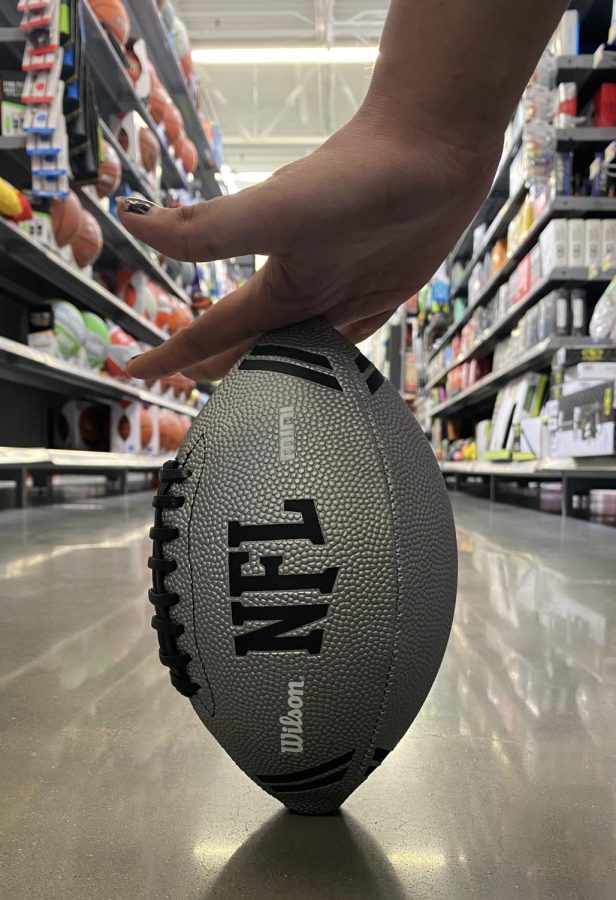OPINION: Down with Thursday Night Football
A white, NFL branded football held up in a store aisle. As the biggest sponsor of football in the United States, the NFL is responsible for when games are scheduled.
October 29, 2022
The recent injury (and subsequent hospitalization) suffered by Miami Dolphins quarterback Tua Tagovailoa in a Thursday night game against the Cincinnati Bengals, has raised an uproar among NFL players, coaches, and fans and sparked many questions and debates about the NFL’s concussion protocols and policies on player safety after Tagovailoa reportedly suffered a serious concussion the Sunday before against the Buffalo Bills that left him dazed and wobbling after suffering the blow and forced him to leave the game in the second quarter.
Tagovailoa would clear the league’s concussion protocol, play the entire second half, and the Dolphins would win the game 21-19, but it was clear to everyone watching that the Dolphins quarterback was nowhere near one hundred percent on the field.
Despite this, Tagovailoa was given a clean bill of health by the NFL’s unaffiliated neurotrauma consultant for the team to play four days later against Cincinnati on the road. With this information, the Dolphins let their starting quarterback take the field and during the second quarter, Bengals defensive lineman Josh Topou sacked Tagovailoa, and he didn’t get back up. Moreover, his hands had frozen, and he was stretchered off the field in an ambulance and taken to the hospital.
This event rightly sparked outrage among the NFL community as to how and why Tagovailoa was able to clear the protocols fast enough to be eligible to play in a game four days later. Some said Tua just shouldn’t have played, some said it was simply a freak accident, the NFL Players Association even announced publicly that they had fired the doctor who had cleared Tagovailoa to play against Buffalo the previous Sunday. But to me, while the NFL’s actions were necessary given the outcome, they fail to address a much larger issue.
The whole reason this situation unfolded the way it did is because Tua Tagovailoa had to rush himself back in order to play a road game against Cincinnati on a Thursday night. If the Dolphins play the next Sunday instead of the following Thursday, Tagovailoa would have had an extra three days to rest and recover before going back into game action. Thursday night football games are the glaring issue that no one wants to address here. The issue isn’t that Tua played, the issue was that he played after a FOUR DAY turnaround!
Thursday night games offer no real benefit to anyone besides the NFL’s bottom line. It doesn’t benefit the players, who have less time to recover from Sunday games, it doesn’t benefit the coaches, who have less time to gameplan for their opponents, and as a result, the competitive product suffers (with the exception of the annual Thanksgiving games, which involve six teams instead of the normal two). Wouldn’t it make more sense to move a game that is played on a Thursday night to Sunday, that way players get more time to get healthy, more fans are able to come, more tickets and concessions are sold, and the owners make a greater profit?
For a league that seems perpetually concerned with its bottom line above all, the math doesn’t really add up. Not even the mighty Jeff Bezos and Amazon, who enlisted big name sports media personalities Hannah Storm of ESPN, Andrea Kremer of HBO and NFL Network, and Michael Smith of NBC, along with a panel of former NFL players can make these Thursday night games interesting (mostly because it meant the games moved to Amazon Prime Video, which is a subscription-based service). The answer seems pretty simple to me, in order for the NFL to consistently put out its best possible product (and maybe make even more money than they already do) it needs to do away with Thursday Night Football and move those games back to Sunday.










Mike • Nov 8, 2022 at 1:27 pm
If you believe the issue is returning too soon from a concussion/neurologic injury, then he shouldn’t have returned to play on Sunday in the original game he was injured in. There is no question that having Thursday night football games does put athletes on a short week for recovery, but each injury is treated differently. If Tua was cleared to return for the remainder of Sunday’s game, then the doctors thought he was also prepared and healthy enough to play four days later based on his recovery during the week.